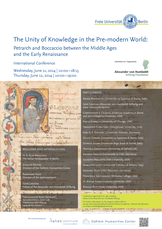Konferenz: "The Unity of Knowledge in the Pre-Modern World: Petrarch and Boccaccio between the Middle Ages and the Early Renaissance"
 |
Die Konferenz fand vom 10. bis 13. Juni 2014 in Berlin statt und wurde organisiert von Igor Candido (Fellow der Alexander von Humboldt-Stiftung 2013/14) in Zusammenarbeit mit dem Italienzentrum und dem Dahlem Humanities Center der Freien Universität Berlin. |
| Programm | |
| 10. Juni 2014 |
|
| 17.30 | Guided Tour through the Italian Embassy and Greeting of The Ambassador |
| 11. Juni 2014 |
|
| 10.00-10.30 | Welcome Greetings and Introductory Remarks Joachim Küpper – Dahlem Humanities Center, Freie Universität Berlin H.E. Elio Menzione, The Italian Ambassador in Berlin Bernhard Huß – Italienzentrum, Freie Universität Berlin Igor Candido – Fellow of the Alexander von Humboldt-Stiftung |
| Panel I: Dante, Petrarch, and Boccaccio | |
| 10.30-11.15 | Manuele Gragnolati (University of Oxford); Francesca Southerden (Wellesley College) From Paradox to Exclusivity: Dante’s and Petrarch’s Lyrical Eschatologies |
| 11.15-12.00 | Gerhard Regn (LMU München) The incipit of the Decameron: Boccaccio, Dante and the Epistemic Index of Storytelling |
| 12.00-12.45 | Igor Candido (Fellow of the Alexander von Humboldt-Stiftung) Dante’s Theological Judgment and Boccaccio’s Suspension of Assent |
| Panel II: Petrarch | |
| 14.30-15.15 | H. Wayne Storey (Indiana University) The Formation of Knowledge and Petrarch's Books |
| 15.15-16.00 | Karl A. E. Enenkel (Westfälische Wilhelms-Universität Münster) Sacra solitudo. The Construction of the Sacred Space in Petrarch's De vita solitaria |
| 16.15-17.00 | Christopher S. Celenza (American Academy in Rome and Johns Hopkins University) Petrarch and the History of Philosophy |
| 17.00-17.45 | Ronald Witt (Duke University) Petrarch and the Creation of the Christian Humanism |
| 17.45-18.15 | Final Discussion |
| 12. Juni 2014 | |
| Panel III: Boccaccio | |
| 10.00-10.45 | Andreas Kablitz (Universität zu Köln) Boccaccio’s Poetics. Remarks on the Proemio of the Decameron |
| 10.45-11.30 | Francesco Ciabattoni (Georgetown University) Boccaccio’s Novel Hecuba: Beritola in the Light of Ovid’s Metamorphoses |
| 11.45-12.30 | Marco Petoletti (Università Cattolica di Milano) Boccaccio, i classici e il Medioevo latino |
| 12.30-13.15 | Paolo Cherchi (University of Chicago) Gli inventori delle cose nel De genealogia di Boccaccio |
| Panel IV: Petrarch, Boccaccio, and Beyond | |
| 15.00-15.45 | Giuseppe Mazzotta (Yale University) Boccaccio's Critique of Petrarch |
| 15.45-16.30 | Renzo Bragantini (Università La Sapienza di Roma) Petrarca, Boccaccio, e lo spazio della letteratura volgare |
| 16.45-17.30 | Giorgio Ficara (Università degli Studi di Torino) Petrarca e la fiaba delle fondazioni (Fam. I, 4) |
| 17.30-18.15 | Giulio Ferroni (Università La Sapienza di Roma) Tra Petrarca e Boccaccio. Strategie della fine |
| 18.15-19.00 | Final Discussion and Conclusive Remarks |
| 13. Juni 2014 |
|
| 10.00-12.00 | Manuscript Exhibition at the Staatsbibliothek Berlin, Handschriftenabteilung Introduction by Giuliano Staccioli |
Internationally renowned scholars were invited to discuss and rethink the historical, intellectual, and literary roles of Petrarch and Boccaccio between the great model of Dante’s encyclopedia, and the ideas of a double or multifaceted culture in the era of Italian Renaissance Humanism. In his lyrical poems and Latin treatises, Petrarch, on the one hand, created a cultural pattern that was both Christian and Classical, exercising immense influence on the Western World in the centuries to come. Boccaccio, on the other hand, translated this pattern into his own vernacular narratives and erudite works, ultimately claiming as his own achievement the reconstructed unity of the Ancient Greek and Latin world in his contemporary age. The Conference aimed to reconsider Petrarch’s and Boccaccio’s intellectual and literary heritages from different perspectives (philosophical, theological, historical, philological, paleographical, literarily, theoretically), and to investigate how these heritages shaped the cultural transition between the end of the Middle Ages and the Early Modern Era.
In Kooperation mit:
 |
 |
